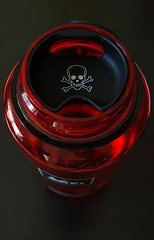Congress To Once Again Consider Legislation That Would Ban BPA From Food Packaging
Congressman Edward J. Markey of Massachusetts is introducing the Ban Poisonous Additives Act of 2013 [PDF], which would prohibit the use of BPA in food packaging and reusable food containers.
The Act would allow for an exemption process if a food producer can demonstrate that it’s not technologically feasible to replace BPA in the packaging or find a non-BPA replacement. However, the producer would be required to submit for approval a plan for going BPA-free within one year. Products that receive a waiver would have to be labeled as containing BPA and carry a warning about the possible negative health effects.
While manufacturers and the FDA have maintained that BPA is safe for food packaging, recent studies have found that around 90% of Americans have traces of BPA in their urine, mainly due to the chemical leaching out of food and beverage packaging.
Markey has tried before, most recently in 2011, to get a BPA ban on the books. And in spite of his proposed bill having 34 co-sponsors, it never made it out of committee.
The new legislation already has the support of 17 other members of Congress — Niki Tsongas (MA), Jackie Speier (CA), Louise Slaughter (NY), Jan Schakowsky (IL), Chellie Pingree (ME), Jerrold Nadler (NY), Jim Moran (VA), Betty McCollum (MN), Carolyn Maloney (NY), Zoe Lofgren (CA), Raúl Grijalva (AZ), Sam Farr (CA), Anna Eshoo (CA), Keith Ellison (MN), Diana DeGette (CO), Lois Capps (CA), and Earl Blumenauer (OR) — along with a large group of 20 public health, consumer protection, and environmental organizations, including our pals at Consumers Union, who have jointly penned a letter [PDF] in support of the legislation.
“BPA exposure poses serious health concerns for consumers, especially since it’s pervasive in products used by millions of consumers across the country every day,” says Ami Gadhia, senior policy counsel for Consumers Union. “Because of these potential risks, Consumers Union believes that the chemical should be banned in all food and beverage containers. Congressman Markey’s BPA Act would help the FDA begin to address the health concerns caused by BPA exposure and would greatly reduce the potential for further exposure to BPA.”
As we see it, the best possible route for all parties is for the food packaging industry to phase out BPA rather than deal with continued ban attempts by legislators and regulators. Last year’s BPA baby bottle “ban” by the FDA was less of a prohibition and more of a recognition by the agency that all legitimate baby bottle manufacturers had already phased out the use of the chemical in their products.
Want more consumer news? Visit our parent organization, Consumer Reports, for the latest on scams, recalls, and other consumer issues.


